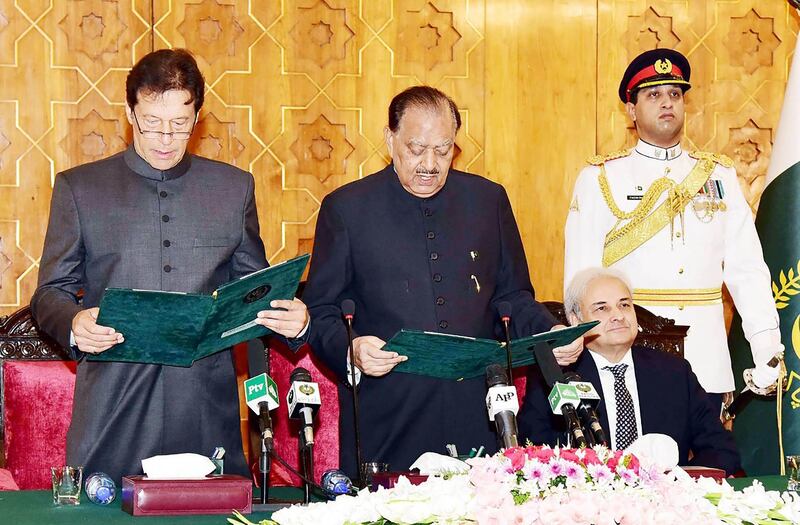Imran Khan has been sworn in as Pakistan's prime minister, marking his transition from cricketer-turned-anti-corruption campaigner to leader of the world's sixth most populous nation.
In a brief ceremony in Islamabad, the 65-year-old took the oath of office in front of military chiefs, ambassadors and members of his political coalition.
After 22 years largely on the political margins vowing to sweep aside the country's dynastic leadership, he now faces the challenge of living up to his supporters' towering expectations.
Mr Khan inherits a country in the grip of an economic crisis which is threatening to derail campaign promises of a new Pakistan complete with overhauled health and education systems.
The former fast bowler wore a traditional black sherwani coat, in the style of Pakistan's founder Muhammad Ali Jinnah, as he recited the oath of office and vowed to respect the constitution.
"I will bear true faith and allegiance to Pakistan," Mr Khan read from the oath, standing next to President Mamnoon Hussain.
Mr Khan won the July 25 general election, but was unable to secure an overall majority in the National Assembly and has spent the past three weeks trading with smaller parties and independents.
______________
Read more:
Is Imran Khan's austere inauguration a harbinger for Pakistan's future?
Beyond the Headlines podcast: Who is Imran Khan?
A political winner at last, Imran Khan begins Pakistan coalition building
______________
He was voted prime minister on Friday afternoon in an unruly and confrontational session that may herald difficulties for his government with a small majority.
After his election he told the divided assembly he would bring "strict accountability".
"Those who have robbed this country, I will hold each and every one of you accountable."
But his speech was disrupted throughout by opposition members shouting "thief, thief Imran Khan" and "puppet".
An opposition bloc including the political parties which have dominated the country's politics for decades has rejected the election results, alleging Mr Khan was the chosen candidate of Pakistan's military and only won because of wholesale electoral manipulation and fraud.
After the assembly clashes of Friday, Saturday's ceremony was dignified and brief.
Earlier suggestions of a celebration including foreign dignitaries such as his Indian counterpart Narendra Modi and show business friends were later scaled back to deliberately austere occasion suitable for someone vowing to curb the country's VIP culture.
In the end, about 150 guests watched Mr Khan repeat the oath in President House. His sporting career was represented with the attendance of members of the team he led to 1992 World Cup victory, as well as India's former cricket star Navjot Singh Sidhu.
After the inauguration, he reviewed a guard of honour on the lawns of the prime minister's house.
While Mr Khan has built his political career on populist promises to sweep away the country's corrupt status quo, his most urgent task will be to rescue its finances.
Pakistan faces a financial crisis with a currency which has devalued several times in recent months and a rapidly widening current account deficit. Finance minister Shamshad Akhtarhas said the country's economic situation is dire.
Finding a bailout, either from a rich ally such as China or Saudi Arabia, or from the International Monetary Fund in Washington, is likely to dominate his early weeks in office.
He must also navigate a relationship with a military which has ruled Pakistan for much of its 71-year history, lays claim to around a fifth of government budgets and considers itself the master of foreign and national security policy.
Mr Khan's inauguration marked only Pakistan's second democratic transfer of power. If he completes his five-year term he will be the first Pakistani prime minister to do so.





